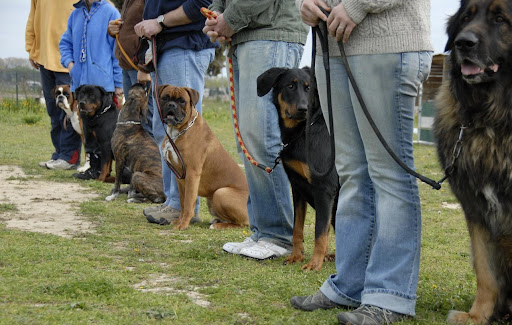National Train Your Dog Month is here, and it can mean new beginnings for both young and old dogs.
January is National Train Your Dog Month
National Train Your Dog Month is an annual month-long event to promote the benefits of training your dog. It was started in 2010 by the Association of Professional Dog Trainers. The goal is to raise awareness that proper training and socialization are critical to a dogs’ wellbeing.
Tips for successful dog training:
Use positive reinforcement. Positive reinforcement means that you focus on rewarding good behavior instead of punishing bad behavior. You reward your dog whenever they behave well and respond positively to your commands. Your dog will, in time, associate the good behavior with the reward.
It is also essential that you do not inadvertently reward unwanted behavior. For example, if your dog is barking or jumping on you to say hello, you should not give your dog your attention. Please wait until your dog has calmed down before interacting with them.
Find a good reward. Not all dogs are motivated by food. Many of them are, but some might prefer going for a short walk or playing fetch in the backyard for a few minutes. By knowing what motivates your dog, you can teach them much faster.
Be consistent. Being consistent in your training is incredibly important. For example, when asking your dog to do something, you always want to use the same word and even the same type of intonation (the rise and fall in pitch of the voice).
Get everyone in the household on the same page. Equally important is for everyone in your family to be on the same page. Dogs need consistency to learn new habits. For example, if you never let the dog on the couch, but your partner does, your dog will just become confused. So, everyone in the household, including kids, needs to participate in the dog’s training at home.
Find the Right Reward
Not every dog is motivated by food or treats (although a great deal of them are) and you may need to find an alternative way to reward them. Some other types of rewards could be going for a short walk, going in the backyard with them, or even just giving them a nice belly rub. Whatever it is that motivates your particular dog, use that for their reward.
Keep it Fun
Remember that training your dog is not only beneficial, but it should also be fun. Dogs thrive on mental stimulation. They love the chance to learn and practice something new. But more than anything, they will relish the opportunity to experience your undivided attention as you both work together toward a common goal. Time spent training is time spent bonding and building a strong relationship between you and your dog, and that is what having a dog is all about in the first place.
Training Older Dogs
If you have an older dog, that does not mean that you cannot train them! The common idiom “you can’t teach an old dog new tricks” ironically does not apply to dogs.
You should indeed start training a dog as early as eight weeks old if you can. But if you did not, it is not too late to start. Also, many dogs are waiting for their forever homes in shelters. There is a likelihood that the previous owners never trained them. Do not disregard him. They can make beautiful pets by giving your love, attention, and training.
When training an older dog, the key thing to keep in mind is to be patient. Older dogs can take some extra time to learn specific behaviors, but they will still learn them. Dogs can keep learning new things throughout their life. You will be successful if you follow the earlier tips in this article.
Final Words
Training your dog is an essential part of being a responsible pet parent. It will allow both your dog and you to live a happier life. If you are having difficulty trying to train your dog, contact us, and we can help point you in the right direction for some help.
Sincerely,
Dr. Janelle McFarland
Wags and Whiskers Veterinary Service
